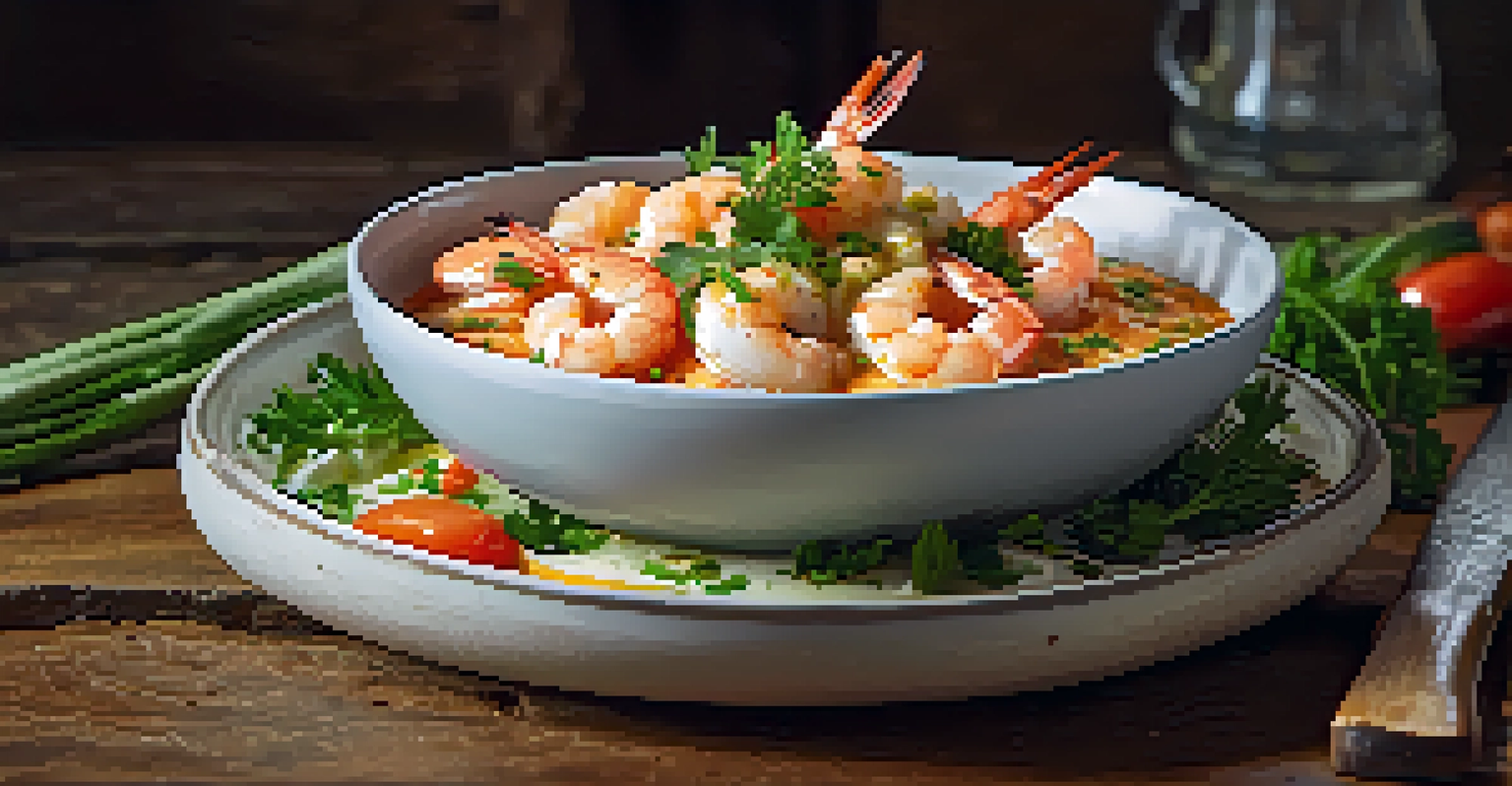Culinary Influences in Southern Cultural Heritage Cuisine

The Roots of Southern Cuisine: A Melting Pot of Cultures
Southern cuisine is a vibrant tapestry woven from various cultural influences. It draws from Native American, African, European, and Caribbean traditions, creating a unique culinary identity. Each group has contributed distinct ingredients and cooking techniques, showcasing the region's rich history.
Food is not just what we eat. It is a reflection of who we are and where we come from.
For example, the beloved dish gumbo highlights this blending of cultures. Originating from West African traditions, it incorporates native ingredients like okra and combines them with European influences such as French roux. This harmonious fusion exemplifies how Southern cuisine evolves over time.
As Southern cooks adapted recipes to include locally available ingredients, they crafted a style that reflects the diverse communities that settled in the region. This constant exchange of flavors and techniques is what makes Southern cooking so dynamic and beloved.
The Role of African American Heritage in Southern Cooking
African American culinary traditions have significantly shaped Southern cuisine, infusing it with soul and creativity. The history of enslaved individuals brought to the South introduced new ingredients and cooking methods that are now staples in Southern kitchens. Dishes like fried chicken and collard greens are direct descendants of these rich traditions.

Soul food, often considered a cuisine of resilience, showcases the resourcefulness of African American cooks. They transformed humble ingredients into delicious meals, turning adversity into culinary art. For instance, using leftover scraps, they created dishes that have now become celebrated classics.
Cultural Fusion in Southern Cuisine
Southern cuisine is a rich blend of Native American, African, European, and Caribbean influences that create a unique culinary identity.
Today, the influence of African American culture is evident in Southern food festivals and restaurants, where chefs pay homage to their ancestors’ culinary wisdom. This ongoing legacy not only preserves history but also enriches the Southern dining experience.
Native American Ingredients and Their Impact on Southern Dishes
Native American tribes have long inhabited the Southern landscape, leaving a lasting impact on the region’s culinary practices. Their innovative use of local ingredients, such as corn, beans, and squash, laid the foundation for many Southern staples. These ingredients are often featured in dishes that celebrate the land's bounty.
Cooking is like love. It should be entered into with abandon or not at all.
A classic example is succotash, which combines corn and beans, representing the harmony of Indigenous cooking. This dish not only reflects the agricultural practices of Native Americans but also highlights their deep connection to the land. Incorporating these ingredients into modern recipes keeps this heritage alive.
As contemporary chefs rediscover native flavors, they are blending traditional techniques with modern twists. This revitalization of Indigenous ingredients offers a fresh perspective on Southern cuisine, honoring the past while inviting innovation.
Spanish and French Influences on Southern Culinary Traditions
The Spanish and French settlers played a crucial role in shaping Southern cuisine, introducing new flavors and cooking methods. From the Spanish, we see the influence of spices and techniques such as frying and braising, which have become integral to Southern dishes. The French, with their emphasis on sauces and presentations, added sophistication to many recipes.
One famous dish, jambalaya, showcases this blend of cultures. With roots in Spanish paella and African influences, it combines rice with various proteins, creating a hearty meal. This dish exemplifies how Southern cuisine thrives on the fusion of different culinary traditions.
African American Influence on Food
African American culinary traditions have profoundly shaped Southern cooking, transforming humble ingredients into celebrated dishes like fried chicken and collard greens.
As these influences melded over time, they created a unique Southern palette that is both diverse and rich. Chefs today continue to explore these roots, crafting dishes that honor their heritage while also appealing to modern tastes.
The Importance of Agriculture in Southern Culinary Heritage
Agriculture has always been at the heart of Southern culinary traditions, shaping what ingredients are available for cooking. The fertile soil and favorable climate allow for a wide variety of crops to flourish, from cotton to tomatoes. This agricultural abundance has greatly influenced Southern recipes and cooking styles.
Farm-to-table dining is a growing trend that emphasizes the importance of local produce, connecting diners to the land. Many Southern chefs prioritize seasonal ingredients, celebrating the region's agriculture through their menus. This not only supports local farmers but also enhances the flavor of the dishes.
By embracing agriculture, Southern cuisine remains rooted in its traditions while evolving to meet modern demands. The connection between food, land, and community is a hallmark of Southern cooking, ensuring that this rich heritage continues to thrive.
Festivals and Celebrations: The Heart of Southern Food Culture
Food festivals are a vibrant expression of Southern culture, bringing communities together to celebrate their culinary heritage. Events like the New Orleans Jazz & Heritage Festival showcase the rich tapestry of Southern flavors, from gumbo to beignets. These gatherings not only highlight the food but also the stories and traditions behind each dish.
During these festivals, attendees can sample a wide array of regional dishes, providing insight into the diverse influences that shape Southern cuisine. They also serve as a platform for local chefs to share their culinary innovations, blending tradition with contemporary trends.
Modern Takes on Southern Classics
Contemporary chefs are reinventing traditional Southern dishes by incorporating global flavors, keeping the cuisine fresh and relevant.
These celebrations foster a sense of community and pride in Southern cooking, ensuring that the culinary arts are passed down through generations. They serve as a reminder of the importance of food in uniting people and preserving cultural heritage.
Modern Interpretations of Traditional Southern Dishes
Today's chefs are reimagining Southern classics, merging traditional recipes with global influences to create something entirely new. This modern twist on Southern cuisine not only keeps the dishes fresh but also appeals to a diverse audience. For example, a traditional shrimp and grits dish might be paired with international spices or ingredients.
As chefs experiment with flavors and techniques, they maintain respect for the origins of these dishes, often telling a story through their food. This approach allows them to celebrate their heritage while pushing the boundaries of Southern cuisine.

Ultimately, these modern interpretations reflect the evolving nature of Southern cooking, showcasing how it can adapt and thrive in a constantly changing culinary landscape. The result is a delicious blend of history and innovation on every plate.